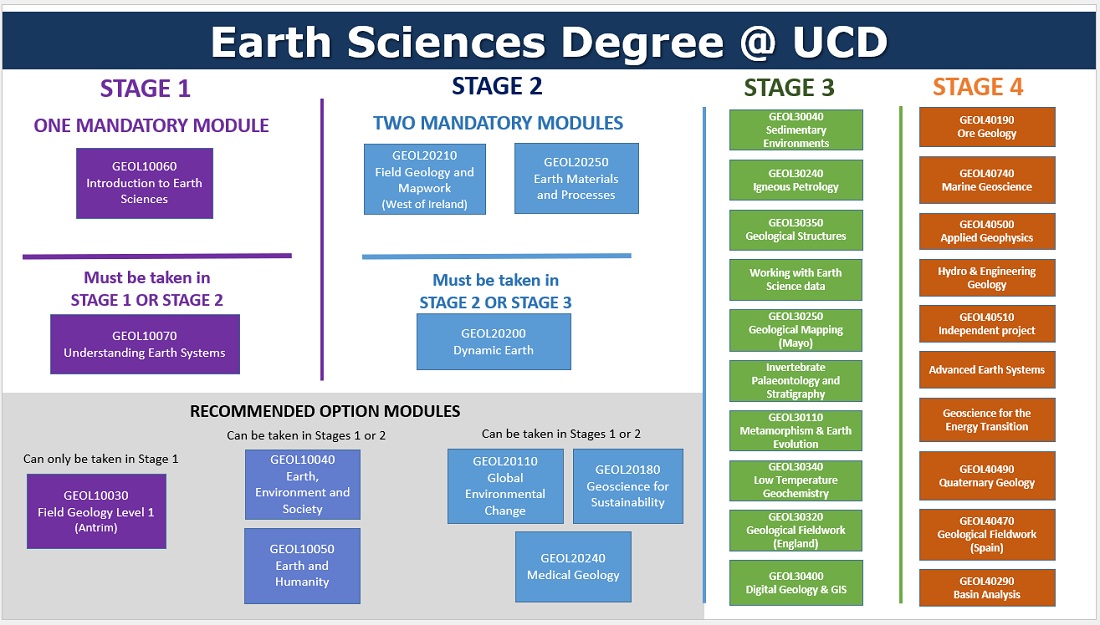Undergraduate Studies
The UCD School of Earth Sciences offers a BSc (Hons) in Geology
How to enter the degree programme?
Entry into the Earth Science degree is via the (opens in a new window)Science at UCD Omnibus (DN200).
Earth Sciences can also be combined with either Archaeology or Geography as a Minor subject (see here for further information).
Why is Earth Sciences important?
Earth Science (or geoscience) is the study of the our planet using all branches of the natural sciences covering aspects of physics, chemistry, biology and physical geography. It applies a wide range of techniques (field, laboratory, mathematical/numerical, computer geomodelling and AI) to understand the Earth System. The discipline provides the basis for a holistic understanding of our planet, including the materials it is made from, its structure, the factors and processes (surface/subsurface and extraterrestrial) that shape it over geological and human timescales (e.g., plate tectonics, mantle convection, earthquakes, volcanoes, landslides, polar icecaps and meteor impacts) and how life has evolved and adapted to past environmental changes. Earth Sciences as a discipline and the skills trained geoscientists possess are more relevant than ever as society grapples with the challenges of climate change and energy/resource sustainability and security. Many of the key scientific aspects of understanding these challenges and finding practical solutions to ensure a more sustainable future is rooted within Earth Sciences.
What will you learn?
Through the DN200 programme, our students study a range of Science subjects and gradually specialise through their preferred pathway within the programme. The Earth Science degree allows students to first explore the Earth and Earth System (Stage 1 modules) before proceeding to teach core geoscience knowledge and skills (Stage 2 and 3). Stage 4 then provides higher level modules, involving the application and integration of previous teaching to analyse key aspects of the Earth System and modules within areas relevant to industry and sustainability (e.g., Quaternary Geology, Marine Geoscience, Ore Geology and Applied Geophysics).
The course teaches both traditional and modern techniques for data collection and analysis including upskilling students in digital skills, the use of standard software and some specialised geoscience software packages as well as Python coding.
The course has a strong field component with field classes across Ireland and overseas (e.g., Spain, Greece and Scotland) which is highly valued by both our undergraduates and employers. The course will especially appeal to those who enjoy being in the outdoors and are looking for a career which is not 100% office based.
Further, students have opportunities to undertake their own independent research projects and work placement opportunities with a company as part of modules in Stages 3 (GEOL30360 & GEOL30390) and 4 (GEOL40510).
Modules and modules choices
The Earth Science degree programme module structure is shown below.
Stage 1 Science (DN200) students wishing to graduate with an Earth Science degree (or to keep this option open) must take GEOL10060 (Introduction to Earth Sciences) which is offered in both the Autumn and Spring trimesters.
For any questions related to the degree structure, module choices or registration please contact the School’s Head of Teaching & Learning ((opens in a new window)lawrence.amy@ucd.ie) or School Administrator ((opens in a new window)sarach.procter@ucd.ie).

What can I do after the degree?
Undergraduates with an Earth Sciences, Geology or other Geoscience-related degree are highly regarded across many employment sectors having acquired a range of critical-thinking and analytical skills including laboratory, numerical and field skills. They are also valued for their ability to deal with complex and incomplete data and their aptitude for both independent and effective teamwork. Most of our undergraduates remain within geosciences successfully finding jobs in Ireland and overseas in areas including hydrogeology, civil engineering and mineral exploration. For further information and resources about Geoscience careers click here.
Further study
The degree is a springboard for many MSc courses and PhD projects in Ireland and overseas. At UCD students can continue their studies in the School by taking a taught MSc degree in Subsurface Characterization and Geomodelling or taking an MSc/PhD by Research. Other relevant MSc courses offered at UCD include Applied Environmental Science, GIS and Remote Sensing, Risk, Resilience & Sustainability or one of the other Sustainability MSc courses.
Further Information
More information on this course, including entry requirements, is available at UCD Course Catalogue.